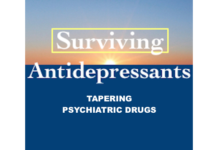Surviving Antidepressants: An Interview with Adele Framer
That is the truth about withdrawal syndrome: It’s like a 50-50 chance that you’re going to have a problem. If you’re in the unlucky half, you’re gonna be really unlucky.
Peer-Support Groups Were Right, Guidelines Were Wrong: Dr. Mark Horowitz on Tapering Off Antidepressants
In an interview with MIA, Dr. Horowitz discusses his recent article on why tapering off antidepressants can take months or even years.
Post-Acute Withdrawal Syndrome (PAWS): Why Don’t We Know More About It?
Persistent antidepressant withdrawal is a debilitating experience, but little research exists about its prevalence and treatment.
Ambushed by Antidepressant Withdrawal: The Escape Story
I’m alive. More than 30,000 veterans in the past decade alone are not. I was not warned of the risks of this drug. I was not told that once on it, I might never be able to get off it, or the nightmare that would ensue when I tried. I know millions of others were not told either.
Medication-Free Treatment in Norway: A Private Hospital Takes Center Stage
At the Hurdalsjøen Recovery Center in Norway, patients with a long history of psychiatric hospitalizations are tapering from their medications and, in a therapeutic environment that emphasizes a good diet, exercise, and asking patients "what do they want in life," are leaving their old lives as chronic patients behind.
Antidepressant Withdrawal Is Common and Debilitating
Those using antidepressants long-term were more likely to experience withdrawal and to have severe withdrawal symptoms.
Systematic Review Finds Antidepressant Withdrawal Common and Potentially Long-lasting
Prominent researchers conduct a review of antidepressant withdrawal incidence, duration, and severity. Results lead to call for new clinical guidelines.
Withdrawal from ADHD Medications
This guide to the scientific literature on withdrawal from ADHD drugs provides a review of animal studies, withdrawal syndromes,
and possible tapering protocols.
Tapering Strips Help People Discontinue Antidepressants
A new study by Peter Groot and Jim van Os has found that tapering strips help people successfully discontinue antidepressant medications.
New FDA Study Shows Benzodiazepines Can Cause Long-Term Injury
The FDA has finally acknowledged the adverse effects of benzodiazepines, the dangers of withdrawal, and that the current packaging does not sufficiently warn of these harms.
The New Yorker Peers into the Psychiatric Abyss… And Loses Its Nerve
The New Yorker's story on Laura Delano and psychiatric drug withdrawal is a glass-half-full story: It addresses a problem in psychiatry and yet hides the deeper story to be told. A story of how her recovery resulted from seeing herself within a counter-narrative that tells of the harm that psychiatry can do.
Researchers Document Protracted Withdrawal from Antidepressants
Protracted Withdrawal Syndrome characterized by long-term adverse experiences after coming off of antidepressants.
Stopping SSRI Antidepressants Can Cause Long, Intense Withdrawal Problems
In the first systematic review of withdrawal problems that patients experience when trying to get off SSRI antidepressant medications, researchers found that withdrawing from SSRIs was comparable to trying to quit addictive benzodiazepines.
NICE Guideline Update Acknowledges Severe Antidepressant Withdrawal
A new update to the NICE guideline for depression suggests providers discuss long-term, severe antidepressant withdrawal symptoms.
Withdrawal from Antipsychotics
A review of the scientific literature related to the withdrawal of antipsychotics: animal studies, withdrawal symptoms, tapering success rates, and consumer accounts of discontinuation.
Withdrawal from Benzodiazepines
A review of the scientific literature related to withdrawal from benzodiazepines, including studies of protracted withdrawal symptoms and risk of relapse related to tapering procedures.
Study Shows Success With Reduced Antipsychotic Use
People who reduced antipsychotic use by tapering were doing just as well after five years as those who continued using the drugs.
Online Experts on Withdrawal
Online communities are stepping in to help people facing withdrawal effects amass information and receive support for their withdrawal experiences.
Withdrawal from Mood Stabilizers
A review of the scientific literature for withdrawal from mood stabilizers: mechanism of action, animal studies, withdrawal symptoms, discontinuation success rates, and relapse rates related to tapering speeds.
Internet Forum for Tapering Psychiatric Drugs Provides Novel Insights
After 15 years, the founder of SurvivingAntidepressants.org, Adele Framer, shares what she has learned about the science of withdrawing from psychiatric drugs.
Existential Therapy Assists Patients Withdrawing From Psychiatric Drugs
Confronting existential anxiety through “Basal Exposure Therapy” shows promising results in people withdrawing from psychotropic drugs.
Very Slow Tapering Best For Antidepressant Withdrawal
A new article in Lancet Psychiatry finds that slower tapering of SSRIs is better for preventing antidepressant withdrawal effects.
Strategies for Tapering and Discontinuing Antidepressants
A new review of strategies to support both patients and practitioners through the process of discontinuing antidepressants.
Study of Online Antidepressant Forums Reveals Long Lasting Withdrawal Effects
Effects of discontinuing SSRIs and SNRIs reported on an online forum indicate significant and long-lasting withdrawal symptoms.
Report Calls For Policy Changes In Response To Dependence and Withdrawal From Prescribed Drugs
Statistics from the UK reveal that prescriptions for painkillers and antidepressants continue to rise despite concerns over dependence and debilitating withdrawal effects. The British Medical Association (BMA) Board of Science has released a report that acknowledges changes to medical practice, research and policy necessary for addressing the dependence and withdrawal effects of benzodiazepines, opioids, and antidepressants.

































